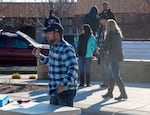The room was bustling at a small Redmond restaurant the Monday after Christmas. A sign on the counter read, “If you’re not wearing a mask we assume you’re exempt.” Most people in view were not masked as they waited for food and margaritas.
But this was no late lunch rush: It was a meeting to marshal support for defying state emergency health orders.
“The only way for my family and my staff to survive is to not comply with the executive order,” said meeting host and Westside Local restaurant owner Amber Amos.
“We are trying to encourage everyone to open Jan. 1,” she told OPB prior to the gathering. “The mayor [of Redmond] is coming. I have an attorney coming to speak on what is happening with the closure and how our industry is being targeted.”
Amos has lately become a public face for questioning the legality and fairness of business restrictions for indoor dining in areas of Oregon that state health officials have deemed an “extreme risk” for spreading the coronavirus. This designation from the Oregon Health Authority bans all indoor dining, gym openings and indoor entertainment. Currently, 24 of Oregon’s 36 counties, including Deschutes where Amos’ is located, are considered “extreme risk.” Most of those counties will stay at that level after Jan. 1, until infection rates decline.
It’s been more than a month since rising virus cases prompted Oregon Gov. Kate Brown to issue more emergency public health orders, which have proved devastating to some businesses while minimally affecting others.
Like Amos, some owners in Central Oregon have ignored this round of state directives. Now, that defiance is growing, with businesses, activists, and a budding coalition of mayors allying to promote a coordinated rebellion that begins New Year’s Day.
Amos said state regulatory agencies have threatened her with enforcement action, and that in the wake of media coverage she has dealt with public backlash and online threats.
“I have had armed guards in front of my restaurant from the time I open until the time I close, who refuse to be paid because they care that much about what I’m trying to do,” Amos said.
She welcomes the presence.
“They’re not here to shoot anyone, they’ll just politely escort them off the property,” she said.
‘A private event’
Amos said she opened her restaurant for the first time in May, after investing tens of thousands to start the business before the pandemic, only to be delayed by the first round of state shutdowns.
“My children’s godfather is in the hospital right now battling COVID. It’s very real. But the problem is that everybody else can be open and we can’t,” she said.
Meetings like the one she hosted Monday have been happening around Central Oregon in recent weeks, drawing business owners and public officials in Redmond, Madras, Bend, and Prineville, while being promoted and guarded by local activists, some of whom are armed.
Amos initially invited OPB to attend her meeting in Redmond, but at the scene, an unmasked man at the door blocked entry. A clear plastic wire coiled on his neck, leading to an earpiece reminiscent of a security force.
“This is a private event,” said Bruce “B.J.” Soper, who is an Oregon leader for a growing regional network known as “People’s Rights.” Amos described her impression of the group as, “God-fearing patriots who care about the bigger picture.”

B.J. Soper prepares to speak at a People's Rights event in Redmond on Nov. 21, 2020.
Emily Cureton Cook
The group’s Oregon-centric website encourages people to join the ranks by signing up for a mass texting service. Its messages promote businesses that aren’t following emergency health guidelines. Its website offers an “Oregon business owner’s guide.” The document falsely claims that wearing a mask is dangerous to a person’s health. It also asserts business owners are breaking numerous laws if they obey emergency public health orders.
For months, Soper, 44, has been the face of this network in Oregon, promoting and posting YouTube videos about its weekly in-person meetings at Aspen Lakes Golf Course in Sisters.
The name People’s Rights and its template for community organizing originate with one of the West’s most well-known anti-government activists. Ammon Bundy — who received international attention in 2016 for orchestrating an armed occupation of the Malheur National Wildlife refuge, and made news again in August for his role in storming the Idaho state capitol — created the People’s Rights network.
Soper led an armed group to Burns, Oregon, in 2016 during Bundy’s occupation, though he has claimed he did not support the Bundys’ methods at the wildlife refuge.
In texts to OPB this week, Soper said Bundy “helped develop the idea of people’s rights,” but was insistent that the network’s leadership is not centralized, and that “Ammon has NOTHING to do with Oregon.”
The network does have a central online hub for its materials, however, and Soper’s group uses the same five-digit number as Bundy for a mass texting service. Bundy also appears in training videos promoted by Oregon chapters. To join the People’s Rights network, people are asked to enter personal information through the main website, before being assigned to state-specific text alerts.
After protesters in Salem violently clashed with state police outside the Dec. 21 special legislative session, those who signed up with Oregon zip codes got an “emergency call to action,” asking them to assemble at the Capitol if they could. In the ensuing hours, some protesters assaulted journalists and broke windows on the Capitol building’s doors. Social media livestreams show Soper at the scene.
after arrests at the capitol, a mass text goes out to all Oregon chapters of this group founded by Ammon Bundy. in Idaho, it's linked to protests of health districts/officials. In Oregon, local militias are backing businesses that defy public health restrictions. pic.twitter.com/MZZj9B1tsT
— Emily Cureton (@emilycureton) December 21, 2020
“Do you not understand the constitution, where it says the Capitol has to be open to the public?” Soper said of the event, as he was ejecting OPB from Monday’s Redmond meeting, where business owners had gathered to talk with a public official about plans for the rebellious reopening.
Soper was adamant that the People’s Rights network is not a militia. His own history of activism includes founding the Central Oregon Constitutional Guard, a group that conducts firearms training and has been profiled as sharing ideals with the broader anti-government movement. Lately, he has collaborated with the regional leader of the Three Percent militia to hold People’s Rights events. A review of social media profiles for “area assistants” of the People’s Rights also shows a theme of anti-vaccine content.
Since the pandemic began, Soper has sent dozens of emails laced with threatening language to public officials, lately signing them as both “People’s Rights Oregon Leader” and “Central Oregon Constitutional Guard.”
In December, he wrote to the Deschutes County commission and sheriff: “If you intend to push forward with this abuse in our Communities, EXPECT US TO FIGHT BACK.” Back in July, the Bend City Council was on Soper’s recipient list, too: “We have created a group of people THOUSANDS strong across this state who will not stand for our rights being abused any longer… You are on notice that we fully intend to defend ourselves from your abuse politically, legally and physically if necessary.” Earlier that same month, in a back and forth with Deschutes County Commissioner Phil Henderson, Soper wrote: “Phil, people are going to get hurt if this continues down this trajectory.”

People's Rights holds a "non-compliance potluck," at Centennial Park in Redmond on Nov. 21, 2020.
Emily Cureton Cook
Political backing
Redmond Mayor George Endicott confirmed he was among those squeezed into Amos’ restaurant Monday, as she made the case for other businesses to unite in defying state restrictions. Endicott said he counted 14 local business owners in the room.
“As luck would have it, I had to step out and take a call as they were discussing what steps they were going to take,” Endicott said. “When I came back in, they had made the decision collectively to open sometime next week.”
Endicott said he wore a mask, but that many people there did not.
“I just think that people as individuals can make up their own minds about how they want to act,” he said, adding that as far as the rogue reopening plan goes: “I can’t condone it, or not condone it. But if you’re going to do that, you better all do it together.”
Other mayors have been bolder in backing plans to override the governor’s emergency orders.
Sandy Mayor Stan Pulliam appeared maskless at a People’s Rights event in Madras last week to promote his own coalition of public officials: Main Street Mayors. Earlier this month, Pulliam wrote an open letter to Gov. Brown, announcing that as of Jan. 1, “members of our coalition operating in counties labeled ‘Extreme Risk’ will voluntarily comply with your requirements for ‘High Risk,’ which will allow restaurants and gyms to open at significantly reduced capacity. We will likewise follow with one level below the state mandate until the risk levels change to reflect our compromise.”
Pulliam told OPB that because desperate businesses are already disregarding the rules, his intention is “to figure out how to make it so people can reopen as safely as possible.”
“This is about our mom-and-pop, locally-owned main street business owners, and communities like Sandy — and across Oregon — who are truly at their wit’s end, and who feel like they don’t have a choice,” he said.
When asked if the description of armed volunteers at the Redmond café concerned him, Pulliam responded: “I can’t have too much to say about that, as long as they are doing it in a safe and respectful manner.”
Pulliam said his first exposure to the People’s Rights network was accepting the Central Oregon group’s invitation to speak with business owners in Madras on Dec. 20, the night before protests in Salem would lead to violence.
“I can certainly understand the frustration of not being allowed to have a voice in your own state Capitol building. But, I certainly do not understand any kind of violent or mob-like activity,” Pulliam said.
A spokesman for Oregon’s Occupational Safety and Health Administration, the state agency charged with enforcing emergency orders relating to worker safety, said businesses that get complaints or otherwise openly defy health restrictions should expect to get more attention from state regulators.
“This virus is a genuine hazard,” OSHA’s Aaron Corvin said.
Protesters opposed to the governor’s orders already have targeted one OSHA inspector who tried to take actions against a business openly flouting restrictions.
As for the threat of armed volunteers, Corvin declined to discuss future enforcement plans. He also didn’t share what his agency plans to do if businesses defy emergency orders en masse.
“We’d have to take a look at that, if or when it happens,” Corvin said. “It wouldn’t come as a surprise if something else unprecedented happens. Ultimately, our mission remains the same. We’re going to just continue to work as hard as we can to keep workers safe.”
